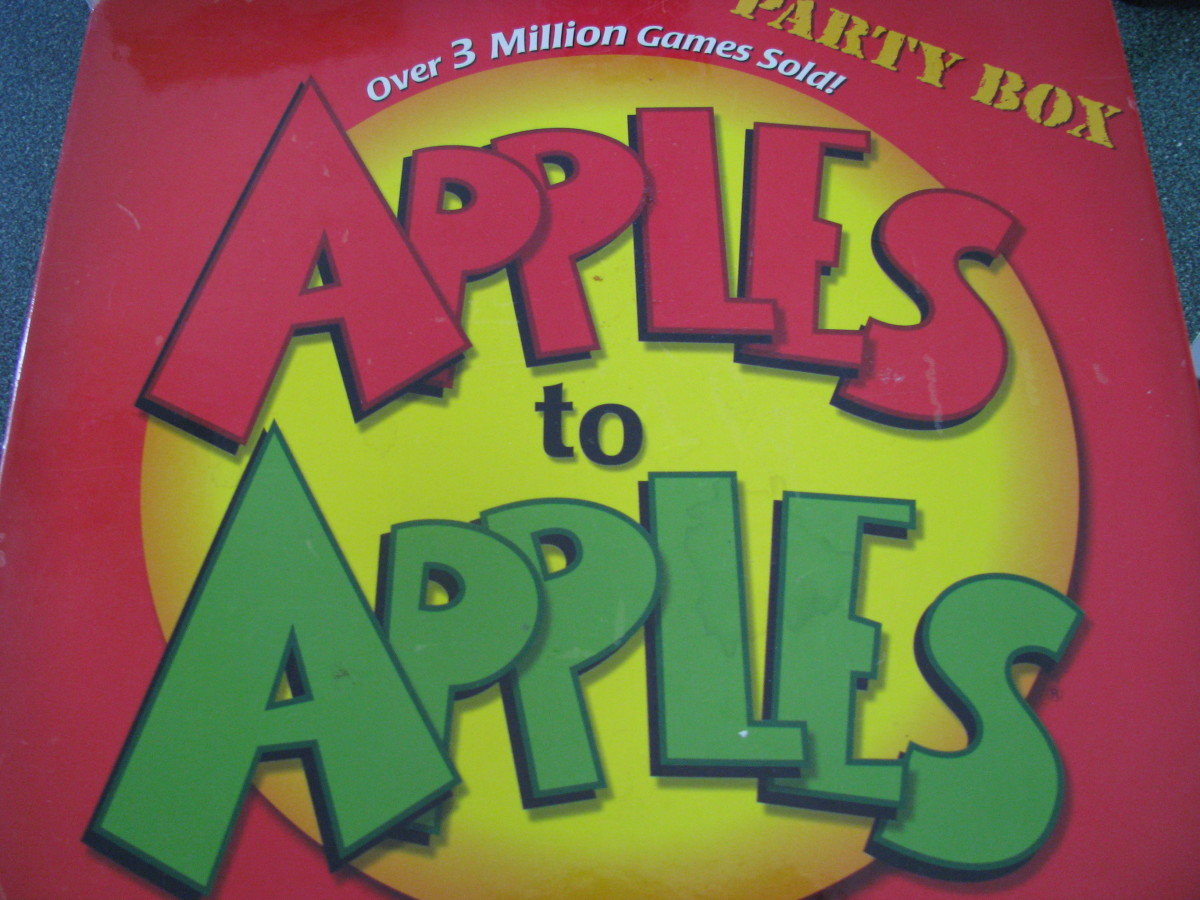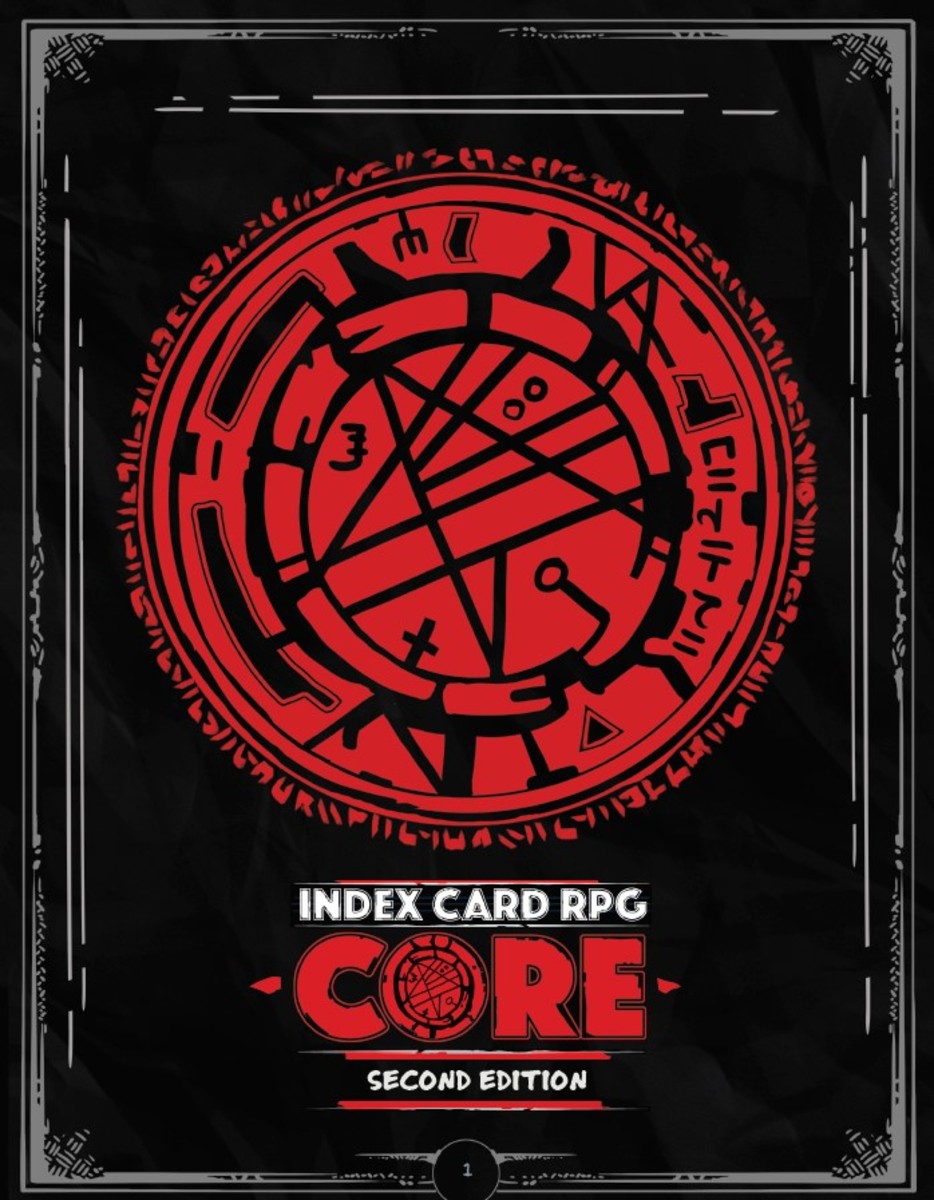Party Game Ideas
Top 5 party game ideas
After numerous debates on Saturday game night, I have come to appreciate just how difficult it is to find a game a group can all agree on. This problem was exacerbated by the fact that most of these games were complicated strategy games that required a great deal of investment in time and energy. There always seemed to be a few games people could fall back on though. The hub consists of party game ideas based on my experiences. It is intended, however, for general groups. Not only may these people not want to invest in complicated games, there may be people you don't know in a party with people you really haven't met before. Having taken part in a number of games, my Top 5 party game ideas include: Apples-to-Apples, Morton's List, Citadels, Mao, and Paranoia. I'll be judging based on
- How easy the game is to play
- Its potential to accommodate large groups of people
- How entertaining it is to a general audience
- Its ability to be a crowd favorite to be played repeatedly.
Party Game Ideas 1: Apples to Apples
Apples to Apples scores high on every criteria. The basic idea of this party game is humorous comparisons. Each player is given a hand of seven cards (red apples). These cards have nouns on them. Each turn one player is the judge (this position rotates). The judge gets a green apple from the deck and turns it over. The green apples are all adjectives. Each player who is not the judge plays a noun card to match with the adjective. Let's say the adjective is "Delicious". The judge turns over the cards and rates one as the best match. So what if you don't have a card that's delicious? You play a card anyway and await the ruling of the judge.
However, the judge has no rules on which card to pick other than the need to pick one. So let's say you play "dryer lint". The judge might decide it to be such a complete opposite that they go with dryer lint instead. Or (if you know the judge well) you might play "pop song" after the 90's pop song "Delicious". There's no telling what the cards will be, and its all part of the fun. There is one thing lacking in this game however: there is no building of tension. It's casual, so the players aren't really invested in someone winning (by winning the most hands). It also requires five red cards per round to be enjoyable. You can squeeze in four by pulling off a random red apple off the top of the deck (the deck has a great track record). Still, it really can't scale down farther than that.
Party Game Ideas 2: Morton's List
Morton's List is a pretty simple game. Essentially, it's a large list of things you could do. Many people have great ideas of things to do, but their internal criticism shoots it down before they can truly consider it. Morton's List is engineered to overcome this barrier. Players compete to be the table master (the one that settles disputes). The table master then rolls Morton's Boulder (a thirty sided die) and follows the various lists in the book until a proper idea comes about. A simplified example would be: do something you used to do when you were a child. (This one resulted in my group making forts out of dorm room furniture.)
The game idea is readily explained and can easily accommodate small and large groups (15+). You have the option of rolling for another quest if you don't like/can't do so any undesirable quests can be tailored to a general audience. It's replay value is high, and unlike Apples to Apples there is a quest to do so people can get invested in the outcome. I would fault Morton's List (and it is a big fault) for one reason. While it is great in loosening you up to do random things, players can take things too far (one of the reasons why you are allowed to reroll). Morton's List includes quests like "perform a minor scam", "play a practical joke on a friend", or "create a public disturbance". Not everyone rerolls.
Party Game Ideas 3: Citadels
Citadels is a strategy card game that's simple enough to understand for first time players but intricate enough to bring people back multiple times. Essentially, all the players are racing towards building 8 buildings. These buildings are cards in your hand paid for by gold which you can spend and earn. The full mechanics don't need explanation, but the game offers nine player spots (and can still accommodate 5-6 players). Each turn players select different political roles (King, Queen, Warlord, etc.) of which there are nine. Each role has a special effect and the cards are played in a specific order. This game can accommodate people for a long time. It is strategic, but not overly so, so people who don't like strategy won't be overwhelmed. The problem with this game is that if you play wanting to win the game it can be quite harrowing. Political roles are hidden until they are flipped over by the player whose turn it is. The first two role cards to play are always the assassin (which stops a players turn) and the thief (who steals a player's gold). Because the remaining role cards are still all hidden, the players with those roles have to guess the best target. Of course, all the remaining players try to make sure they are not the targets. This can lead to a metagame that makes people take forever to pick their roles. A timer might be a worthwhile investment.

Party Game Ideas 4: Mao
The game Mao is a slight mockery of Chair Mao, in the sense that communists often have long lists of arbitrary rules. A version of Mao relies playing simple card game but adding so many additions and addendums that chaos results. The basic skeleton is the uno style game, where you take turns playing single cards (of either the same number or suit) until you go out. I will discuss two variations one simpler and less chaotic, and one complicated and more chaotic.
The simple version is that the group (presumably small) is playing with one deck, and whenever a player goes out, the game freezes and the winner gets to make up a new rule. A new game may start (slower) or the player to go out is simply dealt a new hand. While the rules are arbitrary, they arrive slowly enough that you can remember them to a certain point.
The complicated version is making arbitrary rules, but not telling people what they are! I played a version with house rules that older players knew but didn't explain. Another variation is that before the game starts, you write down an arbitrary rule. Then you pass it to the player on the left, who is in charge of enforcing this rule (having two players know the rule keeps these things fair) The only time a player is to speak is when they are enforcing their rule. Rules discussions are only allowed when two rules so contradict each other that they make the game impossible or when cheating is suspected. The penalty for breaking a rule is drawing an additional card. Taking time is against the rules and so is failure to enforce the rules. You should probably have at least 3 decks for this. However, unlike the other games with $20 tags, this game needs only a standard deck(s) of cards so just go to the dollar store.
Party Games Idea: 5: Paranoia
Although this does not fare too well on some of the measures, I do feel the need to add paranoia. Paranoia is a role playing game. (For reference, it superficially resembles Dungeons and Dragons) These games require imaginations and quite frankly some people's imaginations are much less vivid than others. But if you can get a group into role playing this is where I would start. Paranoia can be run diceless and paperless (though the one running the game will want some reference. The paranoia is something of a mishmash of every bad dystopian sci fi novel from the 50's to the 70's. Players are given (practically impossible) missions where crucial information is above their security clearance, where rebuking the team leader is evidence of treason, and where experimental equipment that always disastrously fails is assigned to the least emotionally stable party member. It is absolutely hilarious and almost always has people looking forward to playing it again.
As far as the other measures go, Paranoia needs four people three plus the game master and maxes out around 7 (six player team). Beyond that you need to search for another competent game master but two GM's could easily handle nine players. So the game can get pretty big. Paranoia is much easier to play then other RPG's because all you really need is a name and a few other traits. So huge groups, easy mechanics, and crowd favorites. What keeps this back at number five? The learning curve. Paranoia is a counterintuitive game.
Let me explain a little more. In other RPG's you have one character over a number of sessions. Losing a favorite character is a real bummer. In Paranoia you get six clones. Yes when one of your character's die, you get a new one. The usual response to a single act of treason is summary execution. "Treason" is a highly flexible term and an easy hurled at you by other members of your party when explaining mistakes/failures. So it's often in your best interests to kill party members... all of them. As the equipment guy, for example, it's in your best interest to make sure everyone's laser doesn't work except for yours. The Happiness officer's job is to give other members of the party happy pills right before combat, etc. This kind of thinking takes some getting used to and it is often best learned from watching more experienced players. So the first time through most people are unsure of what to do. But after this initiation, people always perk up for paranoia.
Some Concluding Thoughts
In this collection of party game ideas I have decided to stay away from high profile games like Pictionary or Boggle or Taboo. These can be found by browsing any basic toy store. They can certainly work in a party environment and this is why they are popular. The reason I shy away from these games is usually because I can't find myself invested in the ending. I play games mostly for fun but all things being equal I want to win. Picking the right role in Citadels is quite tense. Waiting for just another thing to go wrong in Paranoia is intriguing. The uncertainty of a quest from Morton's List is exciting. I hope these games can flavor up your party.











